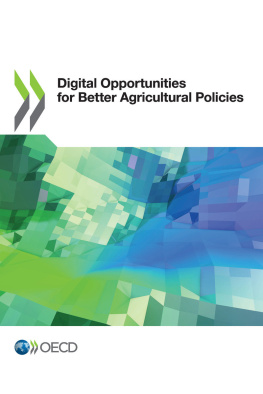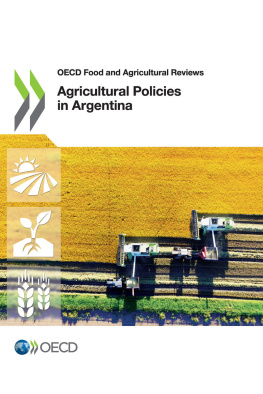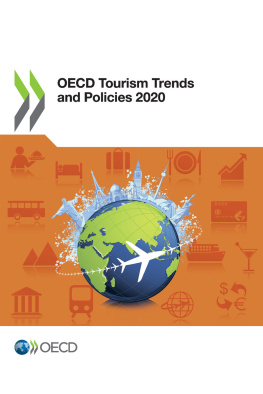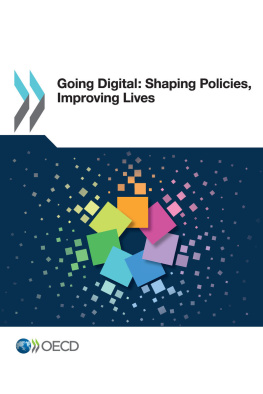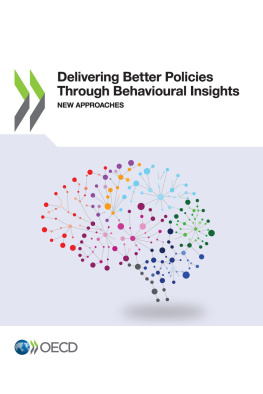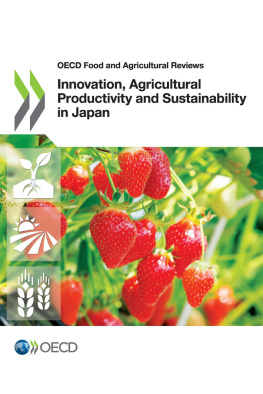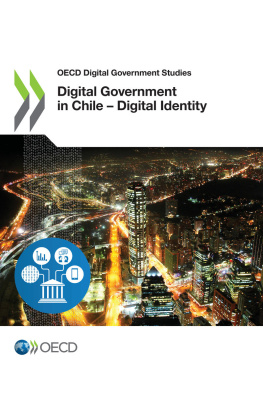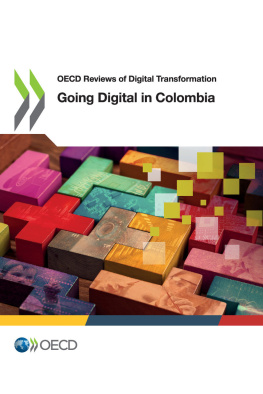OECD - Digital Opportunities for Better Agricultural Policies
Here you can read online OECD - Digital Opportunities for Better Agricultural Policies full text of the book (entire story) in english for free. Download pdf and epub, get meaning, cover and reviews about this ebook. year: 2019, publisher: OECD Publishing, genre: Politics. Description of the work, (preface) as well as reviews are available. Best literature library LitArk.com created for fans of good reading and offers a wide selection of genres:
Romance novel
Science fiction
Adventure
Detective
Science
History
Home and family
Prose
Art
Politics
Computer
Non-fiction
Religion
Business
Children
Humor
Choose a favorite category and find really read worthwhile books. Enjoy immersion in the world of imagination, feel the emotions of the characters or learn something new for yourself, make an fascinating discovery.
Digital Opportunities for Better Agricultural Policies: summary, description and annotation
We offer to read an annotation, description, summary or preface (depends on what the author of the book "Digital Opportunities for Better Agricultural Policies" wrote himself). If you haven't found the necessary information about the book — write in the comments, we will try to find it.
OECD: author's other books
Who wrote Digital Opportunities for Better Agricultural Policies? Find out the surname, the name of the author of the book and a list of all author's works by series.
Digital Opportunities for Better Agricultural Policies — read online for free the complete book (whole text) full work
Below is the text of the book, divided by pages. System saving the place of the last page read, allows you to conveniently read the book "Digital Opportunities for Better Agricultural Policies" online for free, without having to search again every time where you left off. Put a bookmark, and you can go to the page where you finished reading at any time.
Font size:
Interval:
Bookmark:
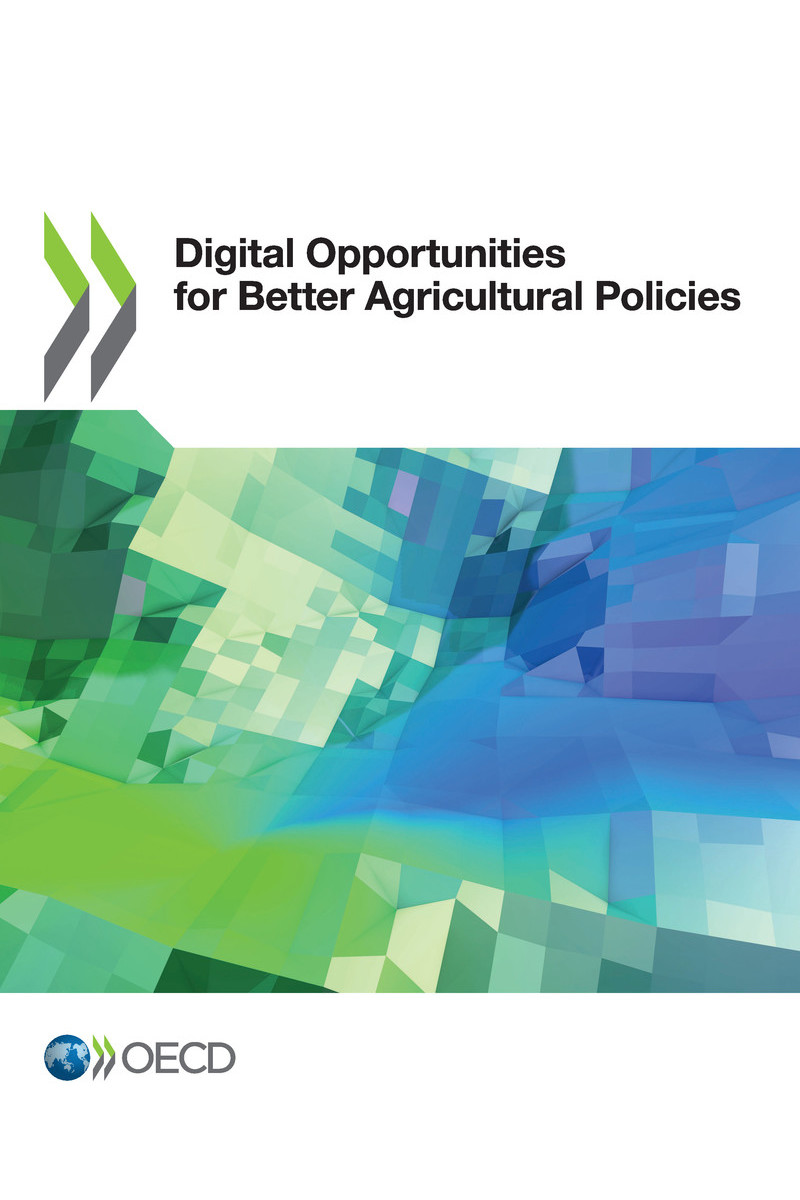
OECD (2019), Digital Opportunities for Better Agricultural Policies , OECD Publishing, Paris, https://doi.org/10.1787/571a0812-en .
This report considers how digital technologies can be used to support agricultural policies within different stages of the policy cycle, with a particular focus on policies to improve agricultural sustainability.
Analysis in this report draws on the relevant literature, expert interviews, the ten in-depth illustrative case studies (Part IV) and the results of a detailed questionnaire sent to OECD members on the use of digital technologies by agencies responsible for designing, implementing and monitoring agri-environmental policies (Annexes A and B).
Chapter 1 provides an overview of the reports findings and policy recommendations.
Part I (Chapter 2) describes recent advances in digital technologies which are the focus of this report, and discusses the drivers of digitalisation in the agriculture sector.
Part II (Chapters 3 and 4) provides an overview of the opportunities of new technologies for better decision-making, policy design and monitoring. It provides a conceptual framework for analysing how digital technologies create opportunities for better agricultural policies. Using the example of agri-environmental policies as a subset of agricultural policies more generally, Chapter 3 then discusses the potential for digital technologies to improve policies within all components of the policy cycle, and how technologies can enable new policy approaches which were previously unfeasible. Chapter 4 discusses the challenges to successful uptake of technologies by policy-makers and programme administrators and provides practical guidance in addressing them.
With a view to ensuring that the use of digital technologies to support policies is well-integrated with the use of these technologies in the broader agriculture and food context, Part III (Chapter 5) provides a high-level overview of the benefits of digital technologies for agriculture and considers the governance and regulatory environment needed to enable the use of data and digital technologies, for policy-making but also for other purposes, while addressing risks. Chapter 5 briefly discusses several issues related to digitalisation of the agriculture sector which are relevant beyond the sphere of using digital tools to improve policy. The OECD is pursuing further work on some of these matters, in particular, on regulatory aspects relating to data governance in agriculture.
Part IV brings together ten case studies developed as background for the rest of the report. Their purpose is illustrative rather than comparative. The case studies focus on different types of digital technologies, and how they are used or managed by public authorities, sometimes in co-operation with the research and private sectors. Together they highlight the diversity of use of technologies for policymaking and implementation, as well as illustrating potential roles for governments in the development of a data infrastructure. The case studies were taken from six countries and regions: Australia (2), the European Union (1) Estonia (1), the Netherlands (2), New-Zealand (1), and the United-States (3). The country and region coverage was not intended to be comprehensive across all OECD countries; the overall selection was based on judgement by the OECD Secretariat and guided by the objective to include a diverse range of relevant examples. The intent is not to provide a systemic review of public bodies initiatives in relation to the use of digital technologies for the design and implementation of agri-environmental policies; this more systematic view was obtained via the use of a Questionnaire designed for this (Annex A). For comparative results, please consult the questionnaire analysis.
This report is authored by Gwendolen DeBoe and Marie-Agns Jouanjean of the OECD Trade and Agriculture Directorate. The ten case studies prepared in support of this report were written by Gwendolen DeBoe (Case studies 1 to 7) and Marie-Agns Jouanjean (Case studies 8 to 10), in collaboration with the following case study participants: Michele Barson (Australian Department of Agriculture and Water Resources), Anti Bleive (Estonian Agricultural Registers and Information Board), Ross Brennan (United States Environmental Protection Agency), Michael H. Cosh (USDA-ARS), Jan Gerrit Deelan (Agricultural Counsellor, Permanent Representation of the Kingdom of the Netherlands to the OECD), Johnny Gonzales (California State Water Resources Control Board), Stephen Hardy (CSIRO), Frans Lips ( Ministerie van Landbouw, Natuur en Voedselkwaliteit ), Richard McDowell (Our Land and Water New Zealand / AgResearch), Aard Mulders (Netherlands Ministry of Agriculture, Nature, Food Quality), Lisa Pearson (Land and Water Science Ltd.), Dimitris Petalios (CREVIS), Jodi Pontureri (California State Water Resources Control Board), Perry Poulton(CSIRO), Clint Rissman(Waterways Centre / Land and Water Science Ltd.), MS Srinivasan (NIWA), Brianna St Pierre (California State Water Resources Control Board), Dan Tindall (Remote Sensing Centre, Queensland Department of Environment and Science & Joint Remote Sensing Research Program), Catherine Tunis (United States Environmental Protection Agency), Oliver Vrtnu (Cybernetica), Inger Wilms ( BoerenNatuur ). However, readers should note that lessons drawn from the case studies are the responsibility of the OECD authors and do not necessarily express the views of the case study participants or their affiliated organisations. The authors gratefully acknowledge the organisations who responded to the questionnaire conducted in support of this report (for a full list, see Annex B).
More generally, the report benefitted from comments and suggestions from OECD delegations, and from OECD colleagues Jesus Anton, Carmel Cahill, Francesca Casalini, Janos Ferencz, Emily Gray, Javier Lopez Gonzalez, Jared Greenville, Franck Jsus, Catherine Moreddu, Julia Nielson, Caroline Paunov and Frank van Tongeren. Theresa Poincet and Stphanie Lincourt helped manage the administrative process, and Michle Patterson and Martina Abderrahmane formatted the report for publication.
Font size:
Interval:
Bookmark:
Similar books «Digital Opportunities for Better Agricultural Policies»
Look at similar books to Digital Opportunities for Better Agricultural Policies. We have selected literature similar in name and meaning in the hope of providing readers with more options to find new, interesting, not yet read works.
Discussion, reviews of the book Digital Opportunities for Better Agricultural Policies and just readers' own opinions. Leave your comments, write what you think about the work, its meaning or the main characters. Specify what exactly you liked and what you didn't like, and why you think so.

